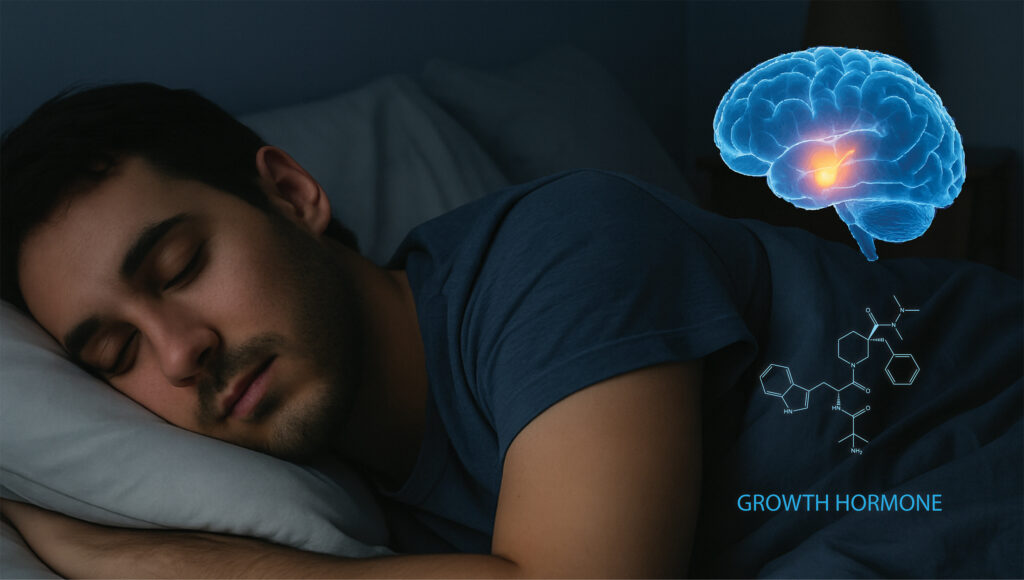
Yang Dan lab/UC Berkeley
As every bodybuilder knows, a deep, restful sleep boosts levels of growth hormone to build strong muscle and bone and burn fat. And as every teenager should know, they won't reach their full height potential without adequate growth hormone from a full night's sleep.
But why lack of sleep - in particular the early, deep phase called non-REM sleep - lowers levels of growth hormone has been a mystery.
In a study published in the current issue of the journal Cell, researchers from University of California, Berkeley, dissect the brain circuits that control growth hormone release during sleep and report a novel feedback mechanism in the brain that keeps growth hormone levels finely balanced.
The findings provide a map for understanding how sleep and hormone regulation interact. The new feedback mechanism could open avenues for treating people with sleep disorders tied to metabolic conditions like diabetes, as well as degenerative diseases like Parkinson's and Alzheimer's.
"People know that growth hormone release is tightly related to sleep, but only through drawing blood and checking growth hormone levels during sleep," said study first author Xinlu Ding, a postdoctoral fellow in UC Berkeley's Department of Neuroscience and the Helen Wills Neuroscience Institute. "We're actually directly recording neural activity in mice to see what's going on. We are providing a basic circuit to work on in the future to develop different treatments."
Because growth hormone regulates glucose and fat metabolism, insufficient sleep can also worsen risks for obesity, diabetes and cardiovascular disease.
The sleep-wake cycle
The neurons that orchestrate growth hormone release during the sleep-wake cycle - growth hormone releasing hormone (GHRH) neurons and two types of somatostatin neurons - are buried deep in the hypothalamus, an ancient brain hub conserved in all mammals. Once released, growth hormone increases the activity of neurons in the locus coeruleus, an area in the brainstem involved in arousal, attention, cognition and novelty seeking. Dysregulation of locus coeruleus neurons is implicated in numerous psychiatric and neurological disorders.

Yang Dan lab/UC Berkeley
"Understanding the neural circuit for growth hormone release could eventually point toward new hormonal therapies to improve sleep quality or restore normal growth hormone balance," said Daniel Silverman, a UC Berkeley postdoctoral fellow and study co-author. "There are some experimental gene therapies where you target a specific cell type. This circuit could be a novel handle to try to dial back the excitability of the locus coeruleus, which hasn't been talked about before."
The researchers, working in the lab of Yang Dan, a professor of neuroscience and of molecular and cell biology, explored the neuroendocrine circuit by inserting electrodes in the brains of mice and measuring changes in activity after stimulating neurons in the hypothalamus with light. Mice sleep for short periods - several minutes at a time - throughout the day and night, providing many opportunities to study growth hormone changes during sleep-wake cycles.
Using state-of-the-art circuit tracing, the team found that the two small-peptide hormones that control the release of growth hormone in the brain - GHRH, which promotes release, and somatostatin, which inhibits release - operate differently during REM and non-REM sleep. Somatostatin and GHRH surge during REM sleep to boost growth hormone, but somatostatin decreases and GHRH increases only moderately during non-REM sleep to boost growth hormone.
Released growth hormone regulates locus coeruleus activity, as a feedback mechanism to help create a homeostatic yin-yang effect. During sleep, growth hormone slowly accumulates to stimulate the locus coeruleus and promote wakefulness, the new study found. But when the locus coeruleus becomes overexcited, it paradoxically promotes sleepiness, as Silverman showed in a study published earlier this year.
"This suggests that sleep and growth hormone form a tightly balanced system: Too little sleep reduces growth hormone release, and too much growth hormone can in turn push the brain toward wakefulness," Silverman said. "Sleep drives growth hormone release, and growth hormone feeds back to regulate wakefulness, and this balance is essential for growth, repair and metabolic health."
Because growth hormone acts in part through the locus coeruleus, which governs overall brain arousal during wakefulness, a proper balance could have a broader impact on attention and thinking.
"Growth hormone not only helps you build your muscle and bones and reduce your fat tissue, but may also have cognitive benefits, promoting your overall arousal level when you wake up," Ding said.
The work was funded by the Howard Hughes Medical Institute (HHMI), which until this year supported Dan as an HHMI investigator, and the Pivotal Life Sciences Chancellor's Chair fund. Dan is the Pivotal Life Sciences Chancellor's Chair in Neuroscience. Other co-authors of the paper are Peng Zhong, Bing Li, Chenyan Ma, Lihui Lu, Grace Jiang, Zhe Zhang, Xiaolin Huang, Xun Tu and Zhiyu Melissa Tian of UC Berkeley; and Fuu-Jiun Hwang and Jun Ding of Stanford University.






